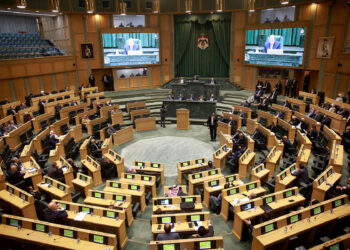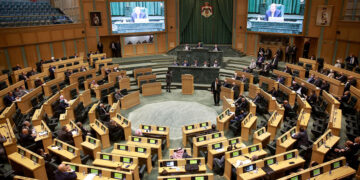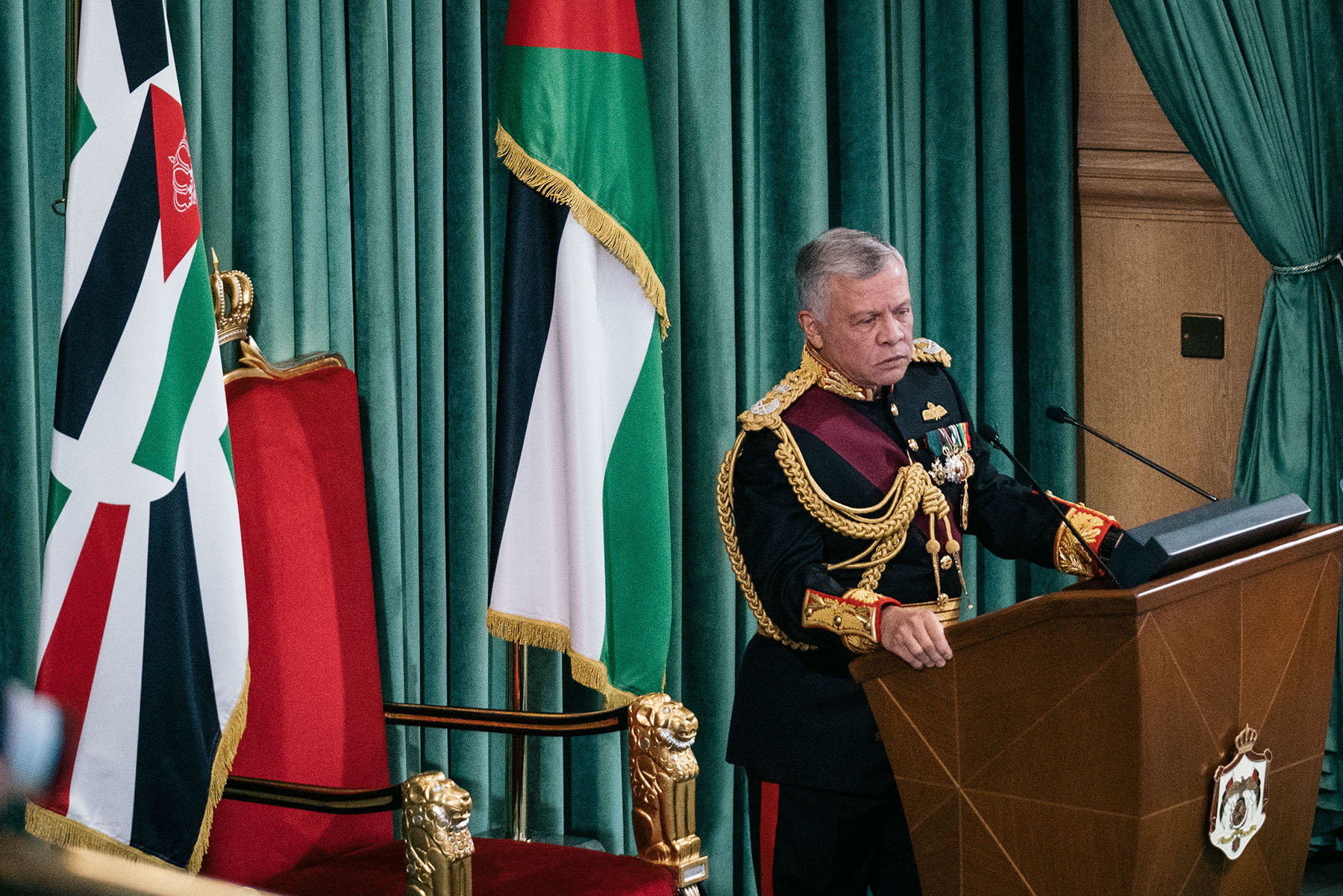Summary
Anas Mohamed El-Beltagy was a 19-year-old student at Ain Shams University preparing to take his semester exams when security forces arrested him in Nasr City on December 31, 2013 with two of his friends. Since his arrest, now almost eight and a half years ago, the Egyptian government has brought six cases against El-Beltagy, acquitted him in four cases on appeal, sentenced him to a year imprisonment in a case he knew nothing about, and manufactured spurious charges in the two outstanding cases against him by refurbishing past charges—all with the singular purpose of keeping him imprisoned indefinitely through pretrial detention.
Over this time, the Egyptian government has kept Anas jailed in maximum security prisons often in inhuman conditions, subjected him to torture, held him in solitary confinement, deprived him of visits with his family and lawyer, and deprived him of an opportunity to complete his college education. The charges against Anas overwhelmingly relate to accusations of political crimes, pursuant to baseless cases brought against him by the Public Prosecution. There is no credible evidence that Anas has committed any crime. Instead, the persecution of Anas appears entirely politically motivated due to his family affiliation. Anas is the son of Dr. Mohamed El-Beltagy, a prominent Muslim Brotherhood leader and former elected parliamentarian who also has been detained since 2013. Security forces also killed his sister, Asmaa El-Beltagy, during the massacre at the Rabaa al-Adawiya sit-in in 2013 where Egyptian security forces killed more than 1,050 people.
Methodology
DAWN researchers interviewed sources close to Anas El-Beltagy and made use of other information from published sources that we consider reliable, as indicated below. Interviews include the following:
Source A: DAWN researchers interviewed Source A on January 6, 2021 and on January 11, 2021, via an online application.
Source B: DAWN researchers interviewed Source B on January 12, 2022, via an online application.
Sanaa Abdel-Gawad: DAWN researchers interviewed Sanaa Abdel-Gawad, Anas El-Beltagy's mother, on February 6, 2022, via an online application.
We do not disclose the identity of our sources to protect their security, unless sources expressly provide for us to disclose their identity. We reference our unnamed sources here as "Source A" and "Source B."
Notes
- This investigation provides only partial documentation of the legal proceedings against Anas El-Beltagy. DAWN researchers found several time gaps during which they could not document any events or legal proceedings regarding Anas' detention, which Egyptian law requires. Family members and Anas' lawyers could not fill these information gaps to explain what happened to Anas during this time. The main reason, according to Sanaa Abdel-Gawad, Anas' mother, is that Anas spent most of his pretrial detention in solitary confinement. His lawyers were not able to meet with him to find out whether any trial sessions or hearings had taken place in their absence. In several instances, the prosecuting judges renewed Beltagy's pretrial detention without him present at the hearing.
- We use Anas El-Beltagy's first name, Anas, instead of his last name to avoid confusing it with his father's name Mohamed El-Beltagy who has also been imprisoned since 2013.
Personal and Professional Background
Anas Mohamed El-Beltagy was born on February 26, 1993, in the Shubra El-Kheima district of Cairo. He is the son of Dr. Mohamed El-Beltagy, a prominent Muslim Brotherhood leader and former parliamentarian who has been detained since 2013 following the military coup that overthrew democratically elected President Mohamed Morsi. When security forces arrested Anas in December 2013, he was a third-year student at Ain Shams University's College of Education and was preparing to take his semester exams. Security forces killed Asmaa El-Beltagy, his sister, during the massacre at the Rabaa al-Adawiya sit-in on August 14, 2013, where they killed more than 1,050 protesters.
Time and Circumstances of Arrest
Security forces first arrested Anas on December 24, 2013, at Tora Prison when he was 19 years old. Prison guards arrested him and his mother, Sanaa Abdel-Gawad, during their visit to see his father, Dr. Mohamed El-Beltagy, who had been imprisoned following the coup in Egypt. During the visit, Mohamed El-Beltagy told his family that he has been on hunger strike for 21 days and that prison authorities put him in a cell by himself. Abdel-Gawad noted that she saw signs of fatigue and stress in El-Beltagy, whose health appeared very poor.
Abdel-Gawad said that she and Anas asked the prison guards to explain why they tortured El-Beltagy psychologically and physically. In response, police forces surrounded them, beat them, and removed her hijab, Abdel-Gawad said. After that, prison authorities sent them to the Maadi Public Prosecution Office seeking to bring charges against them. Tora Prison guards accused Anas and Abdel-Gawad of assaulting them, but the Maadi Public Prosecution released Anas and Abdel-Gawad on bail after twenty hours of detention.
On December 31, 2013, unidentified security forces arrested Anas at the home of one of his friends in Nasr City, where he was studying for his semester exams, according to Source A. Security forces took Anas and two of his friends, Ibrahim Ahmed and Ahmed Abdel Hamid, to Nasr City Police Station 1. According to Anas' mother, Abdel-Gawad, the security forces went to arrest Anas' friends, not Anas. During the arrest, the security officers did not know the identity of Anas. However, according to Abdel-Gawad, at the police station, the investigating officer asked to see his ID card and then asked if he was the son of Mohamed El-Beltagy. When Anas said that he was, the officer reportedly replied, "How come you are still out of prison. We will never leave anyone from your family, and you will never see the sun again."
According to Abdel-Gawad, Anas remained at Nasr City Police Station 1 for about a month before the police transferred him to Abu Zaabal Prison. The police transferred Anas again to Tora Prison, a maximum-security facility, in 2014, where he remains imprisoned today.
Charges
The Supreme State Security Prosecution (SSSP) has charged Anas in six cases since his initial arrest in December 2013, often recycling charges from past cases and applying them to existing cases and simply adding Anas to those cases. These cases are illustrative of the techniques the Egyptian government uses to unjustly hold detainees for years without trial or sentence based on charges in multiple, often overlapping cases, and without presenting evidence to substantiate their charges. It also shows how notwithstanding eventual acquittals on appeal in these baseless cases, Egyptian authorities manage to keep detainees imprisoned for years. DAWN documented six different cases against Anas:
- "Tora Prison Guards" Case: Public Prosecutors first prosecuted Anas, and his mother, Sanaa Abdel-Gawad, in Maadi Misdemeanor Court for assaulting prison guards at Tora Prison. DAWN was unable to verify the case number. The judge acquitted Anas on April 26, 2014, but sentenced his mother, Abdel-Gawad, to six months in prison in absentia.
- "Nasr City Apartment" Case (Case No. 62043/2013): The Nasr City Public Prosecution, chaired by Ahmed Shorb, and Public Prosecutor Amr Sha'aban, accused Anas and two of his friends in December 2013 of possessing weapons and ammunition, joining a terrorist group, and inciting violence. There was no evidence documented to have been presented against them, but Judge Salah Mahgoub sentenced Anas to five years imprisonment in 2019. Anas' lawyer appealed the verdict and eventually, the court acquitted Anas.
- "Marriott Terror Cell" Case (Case No. 1145/2014): This well-known case included as main defendants Australian journalist Peter Christie and two other journalists, Mohamed Fahmy and Baher Mohamed, who worked with Al Jazeera's English channel. Prosecutors accused the defendants in 2014 of collaborating with the banned Muslim Brotherhood organization and participating in anti-army demonstrations. Security forces arrested many of the defendants at the Marriott Hotel on December 29, 2013, which is how the case became known as the Marriott Terror Cell Case or Marriot Cell Case. The Public Prosecution added Anas to this case in June 2014 for unknown reasons, but a judge later acquitted him in March 2018.
- "Illegal Gathering" Case (Case No. 26343/2016): Prosecutors apparently charged Anas in 2016 with attending an "illegal gathering" even though Anas was imprisoned at Tora Prison at the time of the gathering. Source A said that authorities did not inform Anas that they had charged him in this case and that he only learned of the charges against him when prison guards notified him in 2017 that a court had sentenced him to one year in prison on September 6, 2016. Source A and Source B confirmed that Anas did not attend any hearings in this case.
- "Membership in Muslim Brotherhood" Case A (Case No. 640/2018): The Public Prosecution charged Anas in 2018 with joining the banned Muslim Brotherhood organization and publishing "false news, information, and statements about the political and economic conditions in the country with the intent of disturbing public peace and undermining confidence in state institutions." A judge acquitted him and ordered his release in this case in February 2020.
- "Membership in Muslim Brotherhood" Case B (Case No. 1470/2019): The Public Prosecution charged Anas in June 2019 with joining and financing the banned Muslim Brotherhood organization.
Trial and Legal Proceedings
December 24, 2013
Prison guards at Tora Prison accused Anas and his mother, Sanaa Abdel-Gawad, of assaulting them during their visit to see Anas' father, Dr. Mohamed El-Beltagy. Prison authorities transferred Anas and Sanna to the Maadi Public Prosecution Office. After arresting and investigating both of them, the Maadi Public Prosecution Office ordered their release on bail.
December 31, 2013
Unidentified security forces arrested Anas at a friend's house in Nasr City.
January 1, 2014
The Nasr City Public Prosecution, chaired by Public Prosecutor Ahmed Shorb, ordered Anas' imprisonment for 15 days pending investigation in the Nasr City Apartment Case. The investigation by the Public Prosecution Office, which was supervised by Public Prosecutor Amr Sha'aban, alleged that Anas had used his friend's apartment as a headquarters for planning and inciting violence against the police and organizing marches and demonstrations at universities.
January 12, 2014
Public Prosecutor Ahmed Shorb ordered the renewal of the pretrial detention of the three defendants, including Anas, for 15 days pending investigation in the Nasr City Apartment Case.
January 26, 2014
Public Prosecutor Ahmed Shorb ordered the renewal of the pretrial detention of the three defendants, including Anas, for 15 days pending investigation in the Nasr City Apartment Case.
February 18, 2014
Public Prosecutor Ahmed Shorb ordered the renewal of the pretrial detention of three defendants, including Anas, for 15 days pending investigation in the Nasr City Apartment Case.
April 26, 2014
The Maadi Misdemeanor Court acquitted Anas, but imprisoned his mother, Sanaa Abdel-Gawad, for six months in the Tora Prison Guards Case.
June 1, 2014
Public Prosecutor Ahmed Shorb ordered the renewal of the pretrial detention of the three defendants, including Anas, for 15 days pending investigation in the Nasr City Apartment Case.
June 23, 2014
Supreme State Security Prosecution (SSSP) Prosecutor Tamer Al-Ferjani referred the Marriott Terror Cell Case to Giza Criminal Court. Al-Ferjani added Anas as a suspect in this case for unknown reasons while Anas was imprisoned pending investigation in the Nasr City Apartment Case.
July 23, 2014
Judge Mohamed Nagy Shehata presided over the Marriott Terror Cell case. Judge Shehata sentenced seven of the defendants to seven years in prison and 11 defendants to ten years in prison in absentia, but acquitted Anas.
July 24, 2014 – October 2, 2015
Anas' lawyers and family had no information about any hearings extending Anas' ongoing pretrial detention for nearly a year, between July 24, 2014 to October 3, 2015. Anas had told them that prosecutors had extended his pretrial detention on numerous occasions without his presence at any hearing. DAWN assumes that the judiciary renewed his pretrial detention in multiple hearings during this time on a pro forma basis.
April 26, 2015
The Maadi Misdemeanor Appeals Court reviewed the Tora Prison Guards Case appeal. The court upheld the verdict of six months imprisonment for Anas' mother, Sanaa Abdel-Gawad.
May 5, 2015
The Northern Cairo Criminal Court postponed a hearing for the Nasr City Apartment Case, for which prosecutors had already detained Anas for fifteen months.
October 3, 2015
The North Cairo Criminal Court, in a hearing held at Tora Prison and headed by Judge Salah Mahgoub, sentenced the three defendants in the Nasr City Apartment Case, including Anas, to five years in prison. Anas' lawyer appealed the verdict to the Cassation Court while Anas remained imprisoned.
September 3, 2016
The North Cairo Criminal Court rejected Anas' appeal of his conviction in the Nasr City Apartment Case.
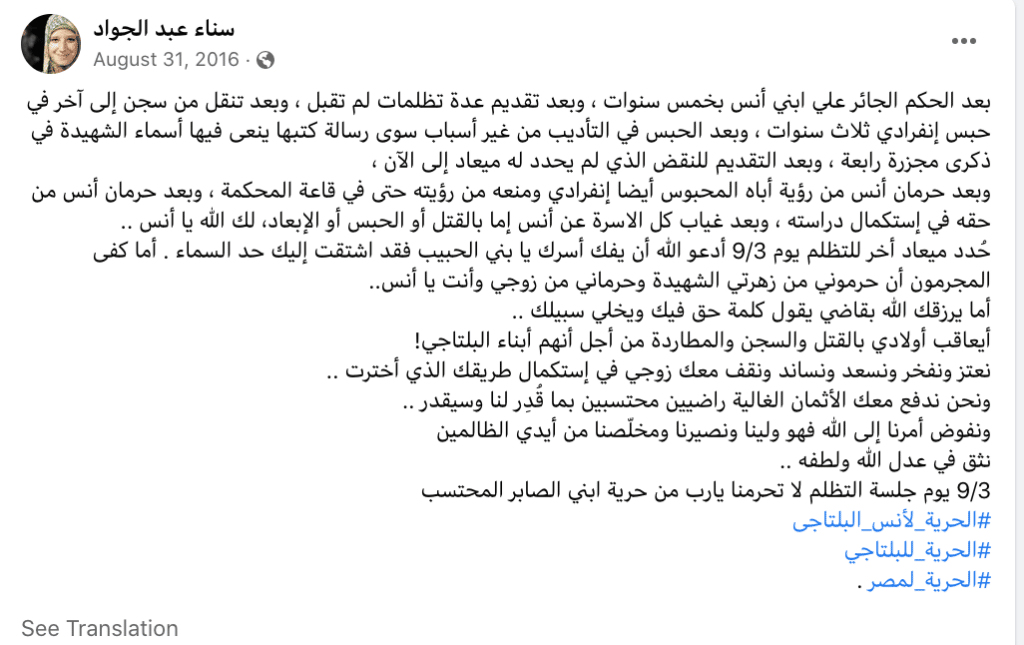
December 8, 2016
The North Cairo Criminal Court rejected a second appeal (a request to stay the execution of a judicial ruling) submitted by Anas' lawyer against his five-year prison sentence in the Nasr City Apartment Case.
June 19, 2017
Authorities informed Anas that while he was at Tora Prison, a court had sentenced him to one year of imprisonment on September 6, 2016 in the Illegal Gathering Case. Source A said that neither Anas nor his lawyer had any knowledge of the case or the court's verdict until nine months after the sentencing.
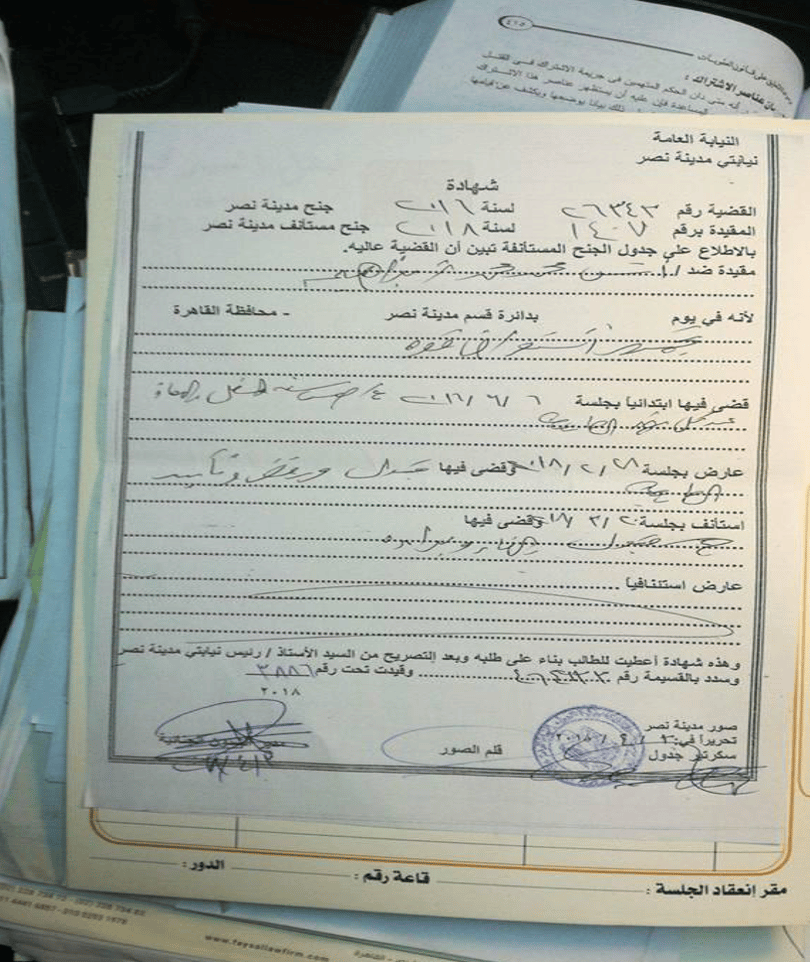
September 7, 2017
Anas was prevented from attending a scheduled hearing, as prison authorities did not bring him to the courtroom. In response, the judge postponed the hearing to December 5, 2017 citing Anas' absence from court as the reason for the postponement.
March 18, 2018
The Court of Cassation acquitted Anas in the Nasr City Apartment Case and abolished his five-year prison sentence. This ruling, which mandated Anas' release, is considered final and cannot be appealed to any other court according to Egyptian law. Instead of complying with this ruling, Egyptian security authorities forcibly disappeared Anas at Nasr City Police Station for about 75 days before manufacturing new charges to bring against him.
March 20, 2018
The Court of Cassation acquitted Anas in the Marriott Terror Cell Case. This ruling is considered final and cannot be appealed to any other court according to Egyptian law.
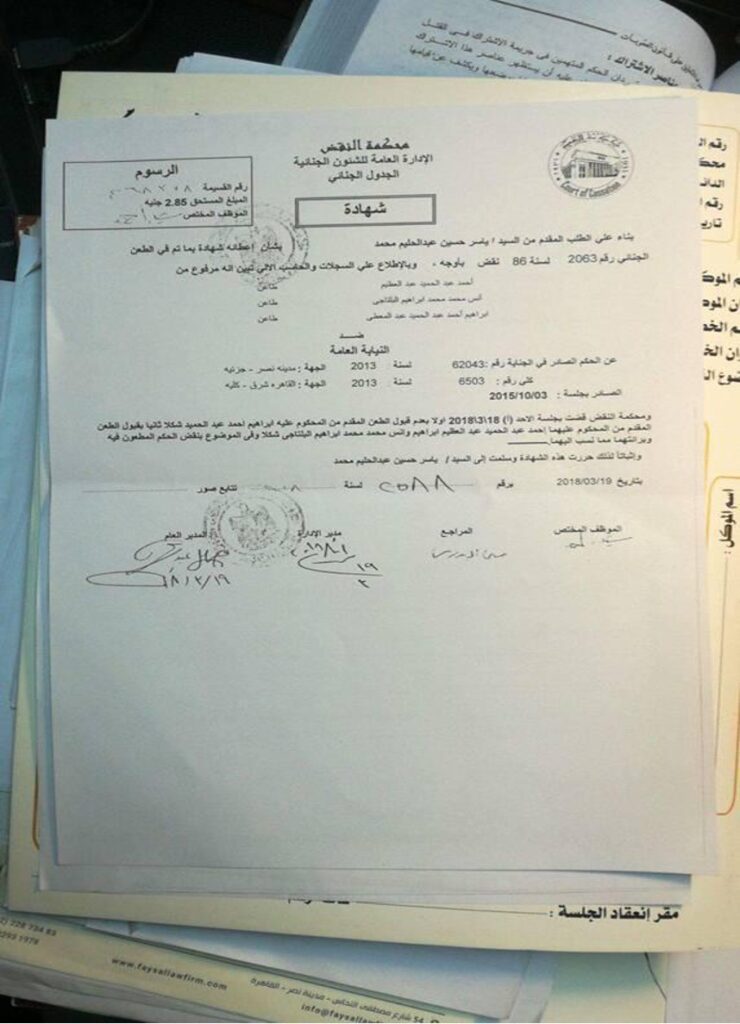
April 8, 2018
After this acquittal, the third in three cases, Egyptian authorities kept Anas in Tora Prison for a few weeks longer. Source A said that security forces eventually transferred him on April 8, 2018 to Nasr City Police Station 1 to finalize the procedures for his release. At this point, Anas had spent over five years in prison in harsh conditions despite being acquitted of all the charges.
May 6, 2018
Anas' mother, Sanaa Abdel-Gawad, posted a distressing video calling on Egyptian authorities to disclose Anas' whereabouts, which became unknown after his acquittal. Anas arrived at Nasr City Police Station 1 on April 8 expecting to be released following the ruling of the Court of Cassation, but he remained unaccounted for.
June 6, 2018
A family member went to Nasr City Police Station 1 to inquire about Anas' whereabouts, but police officers there said that Anas was not there and denied any knowledge of his location.
June 26, 2018
After being forcibly disappeared for about 75 days, the Supreme State Security Prosecution (SSSP) led by Chief Prosecutor Khaled Diaa El-Din, ordered the pretrial detention of Anas for 15 days pending investigation in a new case, Membership in Muslim Brotherhood Case A, alleging membership in the banned Muslim Brotherhood organization.
July 10, 2018
SSSP Chief Prosecutor Khaled Diaa El-Din renewed the pretrial detention of Anas for 15 days pending investigation in Membership in Muslim Brotherhood Case A.
July 25, 2018 – September 4, 2018
Though there is no available record from Anas' lawyer or family on extensions of Anas' pretrial detention in Membership in Muslim Brotherhood Case A, it is assumed that the prosecuting judge issued pro forma extensions.
September 5, 2018
The Supreme State Security Prosecution renewed Anas' pretrial detention for Anas for 15 days pending investigation in Membership in Muslim Brotherhood Case A.
September 20, 2018 – December 28, 2018
Although there is no available record from Anas' lawyer or family for the extensions of Anas' pretrial detention in Membership in Muslim Brotherhood Case A during this period, it is assumed the prosecuting judge issued pro forma extensions of his pretrial detention.
December 29, 2018
The South Cairo Criminal Court, headed by judge Hassan Farid, renewed Anas' pretrial detention for 45 days pending investigation in Membership in Muslim Brotherhood Case A.
February 15, 2019 – May 19, 2019
Although there is no available record from Anas' lawyer or family for the extensions of Anas' pretrial detention in Membership in Muslim Brotherhood Case A during this period, it is assumed the prosecuting judge issued pro forma extensions of his pretrial detention.
May 20, 2019
The Cairo Criminal Court renewed Anas' pretrial detention for 15 days pending investigation in Membership in Muslim Brotherhood Case A.
June 5, 2019 – February 5, 2020
Although there is no available record from Anas' lawyer or family for the extensions of Anas' pretrial detention in Membership in Muslim Brotherhood Case A during this period, it is assumed the prosecuting judge issued pro forma extensions of his pretrial detention.
February 6, 2020
The Cairo Criminal Court ordered the release of Anas and 14 other defendants in Membership in Muslim Brotherhood Case A.
February 12, 2020
Having exhausted the time permitted under Egyptian law to hold a detainee in pretrial detention, the Supreme State Security Prosecution (SSSP) brought new charges against Anas, again for membership in the banned Muslim Brotherhood organization. This case, Membership in Muslim Brotherhood Case B, simply repeated the same charges of the prior case, membership in a banned organization and spreading false news, without providing any evidence to substantiate these claims. The SSSP ordered the imprisonment of Anas for 15 days in pretrial detention.
February 28, 2020 – March 18, 2020
Although there is no available record from Anas' lawyer or family for the extensions of Anas' pretrial detention in Membership in Muslim Brotherhood Case B during this period, it is assumed the prosecuting judge issued pro forma extensions of his pretrial detention.
March 19, 2020
Due to the outbreak of coronavirus, Egyptian authorities banned family prison visits and the delivery of any hygiene products to detainees, including Anas.
August 15, 2020
Anas' family announced that neither they nor Anas' lawyer had been able to visit Anas since 2017.
August 18, 2020
The Cairo Criminal Court, headed by judge Mohamed Saeed El-Sherbiny, renewed Anas' pretrial detention for 45 days in Membership in Muslim Brotherhood Case B.
September 2, 2020 – December 7, 2020
Although there is no available record from Anas' lawyer or family for the extensions of Anas' pretrial detention in Membership in Muslim Brotherhood Case B during this period, it is assumed the prosecuting judge issued pro forma extensions of his pretrial detention.
December 8, 2020
The Cairo Criminal Court renewed Anas' pretrial detention in Membership in Muslim Brotherhood Case B. Prison authorities reportedly did not bring Anas to the courtroom.
December 23, 2020
The Cairo Criminal Court renewed Anas' pretrial detention for 15 days pending investigation in Membership in Muslim Brotherhood Case B.
January 7, 2021 – July 20, 2021
Although there is no available record from Anas' lawyer or family for the extensions of Anas' pretrial detention in Membership in Muslim Brotherhood Case B during this period, it is assumed the prosecuting judge issued pro forma extensions of his pretrial detention.
July 21, 2021
Source A stated that the El-Beltagy family learned on July 21, 2021 that Anas spoke during one of his pro forma pretrial detention renewal hearings. He complained to the judge that his health condition had deteriorated, and said, "I feel a danger to my life and a deterioration in my physical and mental health due to the inhuman conditions of my imprisonment and the isolation in which I live." According to Source A, the El-Beltagy family learned of Anas' statement from the family members of other defendants and lawyers who were in the courtroom when he spoke.
July 31, 2021
Source A stated that Anas started a hunger strike on July 31, 2021 and requested to speak with Public Prosecution officials about the medical negligence he experienced and the deterioration of his health.
August 2, 2021
Anas started a hunger strike and called on the Public Prosecution to investigate his inhuman prison conditions.
August 8, 2021
Anas resumed eating after a prison official agreed to listen to his complaints regarding his medical care and deteriorating health condition.
September 13, 2021
The Cairo Criminal Court's Third Terrorism Circuit renewed Anas' pretrial detention for 45 days pending investigation in Membership in Muslim Brotherhood Case B.
September 23, 2021
Anas' lawyer submitted a request to the court to release Anas as the maximum two-year pretrial detention period mandated by Egyptian law had expired.
October 3, 2021
The court declined the request to release Anas notwithstanding its legal duty to do so.
December 8, 2021
The Cairo Criminal Court's Third Terrorism Circuit renewed Anas' pretrial detention for 45 days pending investigation in Membership in Muslim Brotherhood Case B.
May 17, 2022
The court again renewed Anas' pretrial detention for 45 days pending investigation in Membership in Muslim Brotherhood Case B.
March 29, 2023
Amnesty international published a document in which they said that he had been detained in Badr Prison 1, about 70 km east of Cairo, since November 2022 in cruel and inhumane conditions. For months, he was held in solitary confinement in a very cold cell with fluorescent lights switched on 24 hours a day, not permitted any exercise outdoors and denied any contact with other prisoners. Prison officials continue to ban his family from bringing him any food, climate-appropriate clothes, and medicine. During his detention renewal hearings, in which he sometimes appears with his hands and legs cuffed, he complained about the deterioration of his physical and mental health and psychological condition due to his detention conditions.
Detention Conditions
Anas Beltagy has spent most of the last eight and a half years arbitrarily detained or unjustly imprisoned. He spent most of this time in the notorious Tora Maximum Security Prison, a facility known for prisoner abuse and degrading living conditions.
In her testimony to the Arab Organization for Human Rights, Anas' mother, Sanna Abdel-Gawad, recalled routinely being denied the right of visitation to see her son and being subjected to humiliating treatment the few times she was allowed to visit him. While Anas was detained in Abu Zaabal prison in 2014, she said that Egyptian authorities subjected him to repeated torture and abuse as a campaign of collective punishment against the El-Beltagy family. According to Source A, Abu Zaabal prison authorities held Anas in solitary confinement and forced him to sleep on a bare concrete floor.
When transferred to Tora Prison later in 2014, prison guards held Anas in isolation in a cell that was unfit for human habitation, Abdel-Gawad said. Torture and abuse continued and prison officials deprived Anas of exercise, food, and water until his health deteriorated. They then refused to provide Anas with medical care. Anas was banned from family visits for long periods and often held in a disciplinary cell or in solitary confinement.
On January 11, 2015, Anas' mother, Sanaa Abdel-Gawad, said,
Although my son Anas has been in solitary confinement for a year, today, prison authorities refused to allow me to visit him. Security guards told me that Anas is in a disciplinary cell. They burned all his stuff, such as blankets and clothes . . . In this freezing cold, no blanket, no clothes, no food, no visits, what wrong did Anas do to receive this inhuman treatment?
Abdel-Gawad said she later learned from other detainees that prison officials held Anas in a "prison room," which was a very narrow iron cage set in the middle of the room. According to Source A, who spoke with detainees that walked by Anas' cell nightly, the iron cage was so small that Anas could not sit or properly sleep. He was subjected to torture, including electric shocks, kicking, and punching, and psychological torture, such as being forced to be present in rooms where prison officials tortured other detainees.
On December 31, 2016, Anas wrote a message from inside prison describing the violations against him and the prison authorities refusal to allow him to continue his education, which Egyptian law allows and encourages.
Exactly three years have passed since the night I was arrested. I was prevented from taking my college exams. The arrest came due to a report from a neighbor, following a personal dispute that turned into the most sensational accusation. The tragedy began at the police station when the police officers saw my ID. They said, "You are the son of Mohamed El-Beltagy? . . . How come you are still outside [the prison] until now? . . . We will kill you all!" Only a week had passed since I was released from Maadi Police Station after national security officials had completed their investigations and confirmed that I was not charged with anything. Once they identified me, however, they fabricated several charges against me and included me in another case. . . . They transferred me to Abu Zaabal Prison. My studies were suspended at Ain Shams University. After that, I tried to enroll in more than seven universities, including the governmental open education system and other private universities. They all refused to accept my enrollment without any understandable reason.
According to Anas' mother, Sanaa Abdel-Gawad, the security authorities pressured Ain Shams University not to allow Anas to complete his studies from prison, as allowed (and encouraged) by Egyptian Law. "I went to the college dean [in 2014] and asked him to agree that Anas would complete his studies. He told me it is impossible to allow Anas to complete his studies. He also said the university would not provide him with books, curricula, or even allow him to take the exams," Abdel-Gawad said. She also mentioned that she tried to enroll Anas at a number of private universities, but they denied all her enrollment requests. In addition, the prison authorities refused to allow Anas books.
On November 13, 2020, the El-Beltagy family issued a statement noting that prison authorities had denied them from visiting Anas since 2017 and had held him in solitary confinement since the end of 2017.
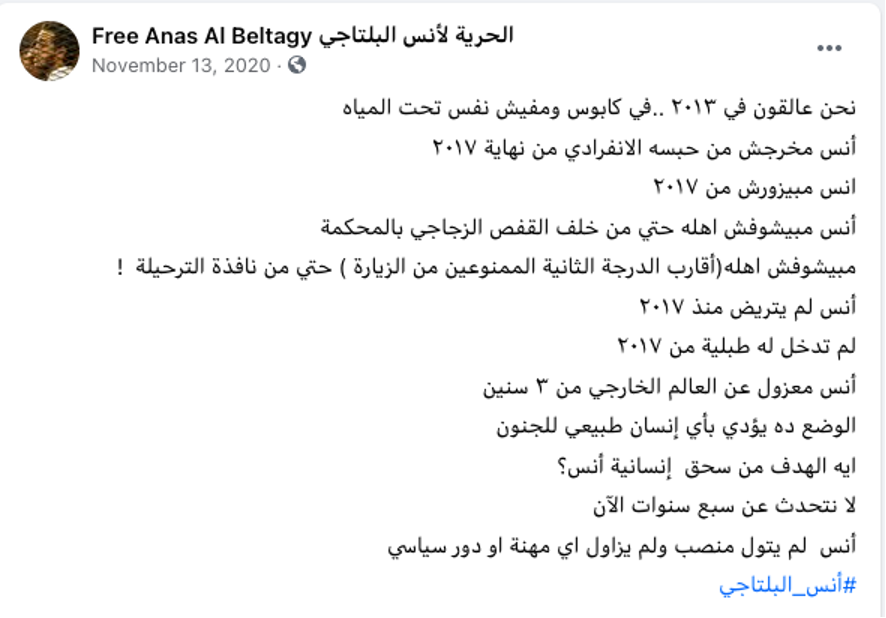
Impact on Family and Professional Life
For the last eight and a half years, Egyptian authorities have imposed collective punishment on the El-Beltagy family through the arbitrary detention, torture, and inhuman treatment of Anas. In addition to the continued arbitrary detention of Anas and his father Dr. Mohamed El-Beltagy, Anas' mother Sanaa Abdel-Gawad has been imprisoned. Egyptian officials also targeted Anas' younger brother Khaled El-Beltagy, arresting and interrogating him in January 2015 before holding him in an unknown location for about a month. Officials released Khaled in February 2015 before repeating the process when they arrested him on September 22, 2015. After that arrest, they held Khaled until November 19, 2015 before they released him. In both instances a disproportionately large number of police officials surrounded the El-Beltagy house before they stormed it, presumably to further harass and intimidate the family.
Because of his years of arbitrary detention and unjust imprisonment, Anas has yet to finish his university studies and earn his college degree even though he was a third-year student when arrested in 2013. Since then, Egyptian officials have frustrated his attempts to resume his studies, denying his application to at least seven different colleges and universities. These measures will have a negative impact on Anas' future when he is released.
Violation of Rights
The Right to Freedom and Security of Person
The Egyptian government security forces that arrested Anas El-Beltagy in December 2013 deprived him of his right to freedom and security of person, as the arrest was made without a judicial warrant and without presenting an arrest warrant.
According to Article 54 of the Egyptian Constitution:
Personal freedom is a natural right that is safeguarded and cannot be infringed upon. Except in cases of flagrante delicto, citizens may only be apprehended, searched, arrested, or have their freedoms restricted by a causal judicial warrant. All those whose freedoms have been restricted shall be immediately informed of the causes therefore, notified of their rights in writing, be allowed to immediately contact their family and lawyer, and be brought before the investigating authority within twenty-four hours of their freedoms having been restricted.
Likewise, Article 9(1) of the International Covenant on Civil and Political Rights states, "Everyone has the right to liberty and security of person. No one shall be subjected to arbitrary arrest or detention. No one shall be deprived of his liberty except on such grounds and in accordance with such procedure as are established by law." Similar legal guarantees safeguarding the right to freedom, liberty, and security of person are found in Articles 3 and 9 of the Universal Declaration of Human Rights and Article 8 of the Arab Charter on Human Rights.
This Egyptian government failed to meet any of the legal criteria set forth in the Egyptian Constitution or applicable international human rights law. As a result, this unlawful arrest violated Anas' right to freedom, liberty, and security of person.
Arbitrary Detention
The Egyptian government has arbitrarily detained Anas for much of the last eight and a half years by renewing his pretrial detention on numerous occasions despite the Public Prosecution failing to present credible evidence to substantiate its claims.
The UN Working Group on Arbitrary Detention has the mandate to "investigate cases of deprivation of liberty imposed arbitrarily or inconsistently with the international standards set forth in the Universal Declaration of Human Rights, or the international legal instruments accepted by the States concerned." The Working Group has established five categories where a deprivation of liberty is arbitrary under these standards. Category I concludes that a detention is arbitrary when, "it is clearly impossible to invoke any legal basis justifying the deprivation of liberty," while Category II concludes that a detention is arbitrary when the deprivation of liberty results from the exercises of the rights and freedoms guaranteed by numerous articles in the Universal Declaration of Human Rights and the International Covenant on Civil and Political Rights, provided the state is party to that treaty. Category III concludes that a detention is arbitrary when "the total or partial non-observance of the international norms relating to the right to a fair trial, spelled out in the Universal Declaration of Human Rights and in the relevant international instruments accepted by the States concerned, is of such gravity as to give the deprivation of liberty an arbitrary character."
As described in detail above, Anas' detention is arbitrary under all three categories and constitutes a violation of international law as set forth in Article 9 of the Universal Declaration of Human Rights and Article 9 of the International Covenant on Civil and Political Rights.
The Right not to be Subjected to Enforced Disappearance
During his lengthy arbitrary detention and unjust imprisonment, security forces have forcibly disappeared Anas for extended periods. For example, Anas' mother stated that for months, she did not know Anas' whereabouts after a judge acquitted him of all charges and ordered his release. In this instance, security officials transferred Anas to Nasr City Police Station 1 from Tora Prison, but instead of releasing him as ordered by the court, they would not disclose his whereabouts until he was brought before another court about 75 days later on baseless charges.
According to the UN Working Group on Enforced Disappearances, "An enforced disappearance is considered to be the arrest, detention, abduction or any other form of deprivation of liberty by agents of the State or by persons or groups of persons acting with the authorization, support or acquiescence of the State, followed by a refusal to acknowledge the deprivation of liberty or by concealment of the fate or whereabouts of the disappeared person, which place such a person outside the protection of the law." Enforced disappearance has three constitutive elements and violate separate provisions of a number of international treaties, including the Universal Declaration of Human Rights, the International Covenant on Civil and Political Rights, and the Convention against Torture and Other Cruel, Inhuman or Degrading Treatment of Punishment. The Declaration on the Protection of all Persons from Enforced Disappearance and the International Convention for the Protection of All Persons from Enforced Disappearance further elaborate on this crime and its prohibition under international law based on existing treaties.
The Egyptian government's detention of Anas and their refusal to acknowledge his whereabouts while placing him outside of the protection of the legal system clearly constitutes an enforced disappearance and a violation of international law.
The Right to a Trial Within a Reasonable Time or to Release
Anas has been in pretrial detention in six different cases from December 2013 until present. Despite being acquitted in four of the six cases brought against him and having no credible evidence presented to substantiate the claims of the remaining two cases, Anas remains arbitrarily detained with no realistic prospect of trial or release. By denying Anas a right to a trial within a reasonable time, Egyptian authorities have violated Egyptian and international law.
Under Article 143 of the Egyptian Criminal Procedure Law, a prosecutor has the right to renew a detainee's pretrial detention for 15 days up to five months (150 days) when the accusation is a felony crime. After 150 days, a prosecutor must receive judicial approval to renew a detainee's pretrial detention. A judge may renew the detainee's pretrial detention for 45-day periods up to eighteen months for felonies and two years for crimes that carry a penalty of death or life imprisonment. Even for the worst criminal accusations, after reaching two years, the detainee must be released. Further, Article 134 of the Criminal Procedure Law only permits pretrial detention in the following circumstances:
- In flagrante delicto [if the defendant was caught in the act of committing the crime].
- Fear of the escape of the defendant.
- Fear of harming the interest of the investigation, whether by influencing the victim or witnesses, or by tampering with the evidence and physical clues, or by making agreements with the rest of the perpetrators to change the truth or obscure its features.
- Preventing serious breaches of security and public order that may result from the gravity of the crime.
- However, the accused may be held in remand if he does not have a fixed permanent place of residence in Egypt, and the crime is a felony or a misdemeanor, punishable by imprisonment.
Further, Article 9(3) of the International Covenant on Civil and Political Rights states:
Anyone arrested or detained on a criminal charge shall be brought promptly before a judge or other officer authorized by law to exercise judicial power and shall be entitled to trial within a reasonable time or to release. It shall not be the general rule that persons awaiting trial shall be detained in custody, but release may be subject to guarantees to appear for trial, at any other stage of the judicial proceedings, and, should occasion arise, for execution of the judgment.
Likewise, the Principles 37 and 38 of the Body of Principles for the Protection of All Persons under Any Form of Detention or Imprisonment provide similar legal safeguards.
Egyptian authorities have failed to explain which of the five circumstances apply to Anas or to provide evidence that supports the continued renewal of his pretrial detention based on any of the five circumstances. Moreover, Egyptian authorities have sidestepped this law by simply bringing the same charges against Anas and adding him to different existing cases after judges have acquitted him and ordered his release. Accordingly, the Egyptian government has violated Anas' right to a trial within a reasonable time under Egyptian and international law.
The Right to Humane Treatment and the Prevention of Torture
Information received from various sources report that security forces have subjected Anas to numerous kinds of torture, first, at Nasr City Police Station 1 when he was imprisoned there between December 2013 and January 2014, and later when he was transferred to Abu Zaabal Prison in January 2014. At Nasr City Police Station 1, police forces reportedly detained Anas for a month in an iron cage in which he was barely able to sit or sleep, and tortured him every day. At Abu Zaabal Prison, prison authorities placed Anas in solitary confinement on an entire floor by himself for an extended period. Prison authorities then transferred Anas again, this time to Tora Prison, where he was held in solitary confinement in a cell unfit for humans, according to information he shared with his family and lawyer. Prison authorities prevented him from visitation for long periods and often kept him in a disciplinary cell during this period.
Article 52 of the Egyptian Constitution expressly forbids torture, while Article 40 of the Egyptian Criminal Procedure Law requires those arrested to be treated in a way that preserves their human dignity and prohibits physical or moral harm. The prohibition of torture is also a recognized human right under international law expressed within treaty and customary international law. Article 5 of the UN Declaration of Human Rights, Article 7 of the International Covenant on Civil and Political Rights, Article 13 of the Arab Charter on Human Rights, and Article 1 of the Convention against Torture and Other Cruel, Inhuman, or Degrading Treatment or Punishment.
The reported treatment of Anas qualifies as torture and violates his right to be treated with dignity and to be prevented from torture under Egyptian and international law.
The Right to Receive Visits and Communicate with the Outside World
The Egyptian authorities have denied Anas his right to receive visits, especially from his family, and to communicate with the outside world. Since 2017, Egyptian prison authorities have denied Anas all family visits in violation of international law and applicable standards of treatment.
Article 37 of the Standard Minimum Rules for the Treatment of Prisoners, adopted by the Office of the UN High Commissioner on Human Rights, states, "Prisoners shall be allowed under necessary supervision to communicate with their family and reputable friends at regular intervals, both by correspondence and by receiving visits." The expanded and updated UN Standard Minimum Rules for the Treatment of Prisoners repeats the requirement. Rule 58 provides that prisoners "shall be allowed, under necessary supervision, to communicate with their family and friends at regular intervals" both through letters, telephonic, electronic, and digital means of communication and through visits. Known as the Mandela Rules, the UN General Assembly adopted these standards in 2015.
Refusing to allow Anas to receive family visits for more than five years is a clear violation of these standards and his international human rights.
The Right to Education
Anas was a third-year college student at Ain Shams University when he was arrested in 2013. According to his family, he submitted numerous requests to continue his studies while in prison. Anas told his lawyers that he tried to enroll in more than seven universities including the public open education system and other private universities, but all his applications and requests were denied. This categorical rejection of Anas' efforts to enroll in college to complete his studies and earn his degree is a likely violation of Article 131 of the Egyptian Prisons Law, which states, "the prison administration should encourage prisoners to learn and educate, facilitate study for prisoners who have the desire to continue their studies, and allow them to sit for their examinations at the headquarters of the committees."
Anas certainly meets these criteria, and the continued and unjustified rejection of his applications to enroll in public and private educational institutions to complete his studies is clearly at odds with Egyptian law, which requires the prison administrator to encourage learning and education.
Officials Involved in Prosecution and Detention
The following officials have contributed to the ongoing unlawful detention of Anas. Since 2013, the government has presented no evidence to justify his imprisonment for over eight and a half, time spent mostly in pretrial detention. Indeed, courts eventually acquitted Anas in four of the six cases brought against him, and there appear to be no grounds for his continued detention in the outstanding two cases, which merely recycle old charges in new cases to keep him imprisoned. Despite this, Egyptian judges and prosecutors have collaborated to keep Anas in prison. Public prosecutors and judges have ordered his pretrial detention nearly one hundred times even though his charges have never met the statutory conditions for pretrial detention.
Khaled Diaa el-Din, head of Egypt's Supreme State Security Prosecution (SSSP), is the prosecutorial official who approves pretrial detentions and renewal decisions issued by SSSP prosecutors working under his authority. Diaa el-Din is responsible for the unlawful prosecution of thousands of Egyptians for peaceful activism, protected by international human rights law. He is responsible for unlawfully prosecuting Anas, and for using his prosecutorial discretion to enforce unjust laws that criminalize peaceful speech. He is also responsible for Anas' unjust, extended pretrial detention, used in Egypt as punishment itself.
Ahmed Shorb, Public Prosecutor and Head of the Nasr City Prosecution Office, and Amr Sha'aban, Public Prosecutor, investigated Anas immediately after his arrest on December 31, 2013. They issued several decisions to imprison him through pretrial detention pending the investigation of the first case against him, despite the absence of any credible evidence to justify the charges or the numerous extensions of pretrial detention.
Judge Salah Mahgoub sentenced Anas to five years in prison on October 3, 2019 in the Nasr City Apartment Case on baseless charges of acquiring weapons and joining a terrorist group, for which no evidence was offered. A court subsequently acquitted Anas and the co-defendants of all charges against them.
Judge Hassan Farid renewed Anas' pretrial imprisonment for 45-day periods on multiple occasions, pending investigation of the baseless charges in the Membership in Muslim Brotherhood Case A. That case recycled previously dismissed charges the prosecution had used against Anas and for which judges had already acquitted Anas.
Judge Mohamed Saeed El-Sherbiny renewed Anas' pretrial imprisonment for 45-day periods on multiple occasions, pending investigation of the baseless charges in the Membership in Muslim Brotherhood Case B. Like the Membership in Muslim Brotherhood Case A, this case simply recycled previously dismissed charges the prosecution had used against Anas and for which judges had already acquitted him.
International Reactions
Anas' case has received little coverage from international media and only occasional coverage from Egyptian and regional media. Outside of Egypt, most coverage is quite dated and typically refers to Anas' arrest in 2013. Recently, in March 2022, Beltagy was included in a joint letter from 23 human rights organizations urging the Egyptian government to release arbitrarily detained political activists, several of whom were on lengthy hunger strikes to protest their continued unlawful pretrial detention.



























